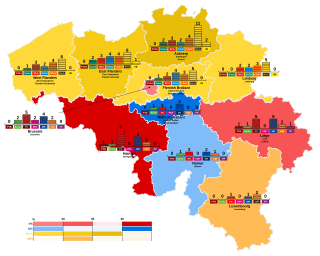
A senate is a deliberative assembly, often the upper house or chamber of a bicameral legislature. The name comes from the ancient Roman Senate, so-called as an assembly of the senior and therefore considered wiser and more experienced members of the society or ruling class. However the Roman Senate was not the ancestor or predecessor of modern parliamentarism in any sense, because the Roman senate was not a de jure legislative body.

The politics of Belgium take place in the framework of a federal, representative democratic, constitutional monarchy. The King of the Belgians is the head of state, and the prime minister of Belgium is the head of government, in a multi-party system. Executive power is exercised by the government. Federal legislative power is vested in both the government and the two chambers of parliament, the Senate and the Chamber of Representatives. The federation is made up of (language-based) communities and (territorial) regions. Philippe is the seventh and current King of the Belgians, having ascended the throne on 21 July 2013.

The Kingdom of Belgium is divided into three regions. Two of these regions, Flanders and Wallonia, are each subdivided into five provinces. The third region, Brussels, does not belong to any province, nor is it subdivided into provinces. Instead, it has amalgamated both regional and provincial functions into a single "Capital Region" administration.
The National Democracy is a francophone Belgian far-right political party. The party advocated a strong unitary Belgian nationalism, strongly opposed immigration, and reached out to Flemish voters.

The Federal Parliament is the bicameral parliament of Belgium. It consists of the Chamber of Representatives and the Senate. It sits in the Palace of the Nation in the centre of the nation's capital, Brussels.

The Senate is one of the two chambers of the bicameral Federal Parliament of Belgium, the other being the Chamber of Representatives. It is considered to be the "upper house" of the Federal Parliament. Created in 1831 as a chamber fully equal to the Chamber of Representatives, it has undergone several reforms in the past, most notably in 1993 and 2014. The 2014 elections were the first without a direct election of senators. Instead, the new Senate is composed of members of community and regional parliaments and co-opted members. It is a chamber of the communities and regions and serves as a platform for discussion and reflection about matters between these federated entities. The Senate today plays a minor role in the federal legislative process. However, the Senate, together with the Chamber, has full competence for the Constitution and legislation on the organization and functioning of the Federal State and the federated entities. Since the reform of 2014, it holds about ten plenary sessions a year.

Elections in Belgium are organised for legislative bodies only, and not for executive functions. Direct elections take place for the European Parliament, the Chamber of Representatives, the Parliaments of the Regions, the Parliaments of the Communities, the provincial councils, the municipal councils and the councils of Districts of Antwerp. Voting is mandatory in federal elections, and all elections use proportional representation which in general requires coalition governments.

The Treaty of Accession 2005 is an agreement between the member states of European Union and Bulgaria and Romania. It entered into force on 1 January 2007. The Treaty arranged accession of Bulgaria and Romania to the EU and amended earlier Treaties of the European Union. As such it is an integral part of the constitutional basis of the European Union.

The Constitutional Court plays a central role within the federal Belgian state. This is a judicial court founded in 1980. Its jurisdiction was augmented in 1988 and 2003.

The Chamber of Representatives is one of the two chambers in the bicameral Federal Parliament of Belgium, the other being the Senate. It is considered to be the "lower house" of the Federal Parliament.

Federal elections were held in Belgium on 10 June 2007. Voters went to the polls in order to elect new members for the Chamber of Representatives and Senate.

Federal elections were held in Belgium on 21 May 1995 to elect members of the Chamber of Representatives and Senate. The Christian People's Party (CVP) kept its position as largest party in Flanders and overall in Belgium, and Jean-Luc Dehaene (CVP) continued as Prime Minister.

The Constitution of Belgium dates back to 1831. Since then Belgium has been a parliamentary monarchy that applies the principles of ministerial responsibility for the government policy and the separation of powers.
Marc Ernest Elisabeth Robert Juliette Verwilghen is a Belgian politician.
General elections were held in Belgium on 16 November 1919. Although the Belgian Labour Party received the most votes in the Chamber of Representatives elections, the Catholic Party remained the largest party in both the Chamber and the Senate. Voter turnout was 88.5% in the Chamber elections.

Wouter Beke is a Belgian politician and a member of the CD&V. He was reelected as a member of the Belgian Senate in 2007. In 2014 he became a member of the Belgian Federal House of Representatives and was reelected in 2019. In July 2019 he succeeded Kris Peeters as Federal Minister for Work, Economy and Consumer affairs. He left the Belgian Federal Government in October 2019 to become Minister for Welfare, Public health, Family and Poverty reduction in the Flemish Regional Jambon Government.

Federal elections were held in Belgium on 25 May 2014. All 150 members of the Chamber of Representatives were elected, whereas the Senate was no longer directly elected following the 2011–2012 state reform. These were the first elections held under King Philippe's reign.

Stephanie D'Hose is a Belgian politician who served as President of the Senate from 2020 until 2024.
This page is based on this
Wikipedia article Text is available under the
CC BY-SA 4.0 license; additional terms may apply.
Images, videos and audio are available under their respective licenses.











